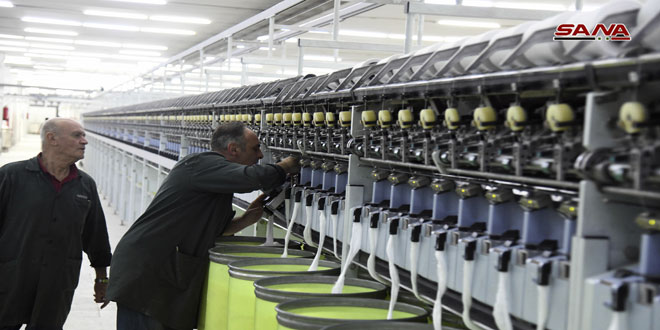Two years after Aleppo Liberation from Terrorism, the City’s Textile Industry Overcomes Challenges and Rises Again
ALEPPO, (ST)- Over tens of years, the Syrian textile and spinning industry has enjoyed prestigious reputation in the region and the entire world due to the great taste and vocational touch the workers in this sector enjoy. It has remarkably flourished in the Syrian province of Aleppo to be a landmark of the Syrian industry and a source of pride for all the Syrians.
Industrialists in Aleppo, over tens of years, have managed to build an empire for the textile industry through establishing hundreds of factories which are unmatched in the Middle East in terms of its modernity.
Unfortunately, the textile industry in Aleppo was a main target of the Turkish-backed terrorist groups which attacked the Sheikh Najjar Industrial Zone in the province, vandalized it and destroyed most of the industrial facilities and caused huge loss to industrialists. Those terrorists were also used by the Turkish regime as a tool to loot hundreds of factories and smuggle the equipments to Turkey with the aim of destroying the Syria economy.
However, armed with strong determination and backed by the support of the people of Aleppo, the hero Syrian army carried out a wide military operation to ride the province from terrorism and managed to liberate the city of Aleppo from the takfiri terrorists two years ago and restore security and stability there. Thus, the industrial zone breathed life and witnessed the return of industrialists to inspect the damage in their facilities as to rehabilitate them.
Industrialists of Aleppo suffered huge losses as they found the factories they had built over tens of years destroyed, but this couldn’t affect their will to start again. After Aleppo liberation from terrorism, the industrialists, with the support of the government, began working hard to rehabilitate parts of their facilities and, thus, they managed within months to resume production and enter the markets again.
The sound of machines roaring in factories signaled the reinvigoration of industrial and economic sectors as well as a significant step towards the resumption of production following more than 3 years of enforced hiatus due to the atrocities perpetrated by the armed terrorist groups.
SANA visited some factories targeted by terrorism in Sheikh Najjar industrial zone and saw the production process two years after Aleppo liberation from terrorism.
 “Al-Faisal for Spinning” factory is one of the most important facilities in Sheikh Najjar Industrial zone, It has got several international certificates for high quality and competitive production. The facility was exposed to destruction because of terrorism, but now it is rebuilt and production started with distinguished specifications not only at the local level but also at the Middle East level in terms of quality and quantity.
“Al-Faisal for Spinning” factory is one of the most important facilities in Sheikh Najjar Industrial zone, It has got several international certificates for high quality and competitive production. The facility was exposed to destruction because of terrorism, but now it is rebuilt and production started with distinguished specifications not only at the local level but also at the Middle East level in terms of quality and quantity.
Bassam Dawalibi, the Administrative Manager of the facility explained to SANA the factory’s situation before and after rehabilitation through some photos hanged inside the factory to tell about the horrible crimes committed against industry in Syria in general and in Aleppo in particular.
He made it clear that he managed to rebuild and rehabilitate all the machines and he was able to resume production with the same quality, pointing out that his factory produced threaded yarns which are needed domestically and in neighboring countries, but, for now, production covers only the need of the local market, because the factory can’t at present work in its full production capacity.
Mohammad Sabbagh, Owner of “al-Sabbagh Group for Blankets Production”, said that he owned nine industrial facilities, unfortunately all were completely destroyed except for one. He pointed out that the production of his factories has reached all over the world due its international standard specification.
Another factory for producing industrial carpets was also targeted by terrorism, but it resumed work gradually after the liberation of Aleppo.
Abdul Hafeez Sweid, an agent of al-Aqqad Factory for carpets, yarns and rugs production, said that the factory resumed work and started to restore its reputation and customers.
Hamda Mustafa

